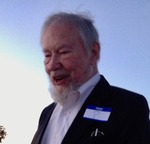Forrest M. “Frosty” Landon
Sept. 24, 1937 – July 19, 2021

The founding director of the Virginia Coalition for Open Government, Forrest M. “Frosty” Landon died in Roanoke on July 19 after a long battle with Parkinson’s Disease. He was 87.
Frosty was more FOIA than FOIA itself. He knew the law inside and out and understood the delicate balance between the public’s right to know and the government’s occasional need for confidentiality.
But mostly he knew people. He understood their motivations and identified where he could meet them philosophically and in reality. He remembered everyone and everyone remembered him.
He suffered unfortunate nicknames such as Frodo, owing to his short stature, and Osama bin Landon, owing to his oft-times scraggly beard.
Jeff South, VCOG’s board president quipped that Frosty is probably in heaven right now submitting FOIAs about who passed through the pearly gates last night.
The Roanoke Times, where Frosty devoted decades of his pre-retirement life as a reporter and ultimately as the editor, wrote about his long career and many accomplishments. Further details about Frosty’s boundless energy and enthusiasm were captured in this obituary.
I met Frosty just two years after VCOG started up and I had the honor of working for him for nearly 10 years before he retired for a second time. I wrote a remembrance of him that asks (gratefully) what it was that led him to take a chance on a stranger who now strives every day to carry the banner of open government in Virginia at least as high as he did.
His family asked that memorial contributions in Frosty’s name be made to VCOG or the United Way.
New board members
VCOG is happy to welcome three new board members to its ranks. Joshua Heslinga of Hanover is the director of legal and legislative services for the Virginia IT Agency, Anita Shelburne of Charlottesville is the editorial page editor for The Daily Progress, and Jay Speerof Richmond is the director of the Virginia Poverty Law Center.
In-person public comment returns…or does it?
As meetings move from the Zoom square to the town square, some public officials were no doubt longing for a the mute button. Several school boards around the state have encountered unruly in-person public comment periods. From Augusta, James City, Loudoun and Washington counties, Virginia Beach, Suffolk and others, citizens have refused to yield after their speaking time was up and heckled from the audience, while public officials have cut microphones, called recesses and escorted some speakers out of the building. The topics prompting the angry exchanges usually related to critical race theory, masks in school and transgender rights.
But beyond these lightning-rod issues, there’s also a concerted effort by many officials, at the local and state level, to cut the number of meetings a public body must hold in person. The FOIA Council continues to receive chain letters and other pleas to relax the rules on electronic meetings in an unspecified way. And the budget bill currently being considered at the General Assembly special session includes this language.
That notwithstanding any other provision of law, any permanent or interim legislative study or advisory commission, committee, or subcommittee, other than a standing committee of the General Assembly to which bills and resolutions are referred during a legislative session pursuant to Article IV, Section 11 of the Constitution of Virginia, or any executive advisory board or council may conduct a meeting by electronic communications means without a quorum of the public body physically assembled at one location if the meeting is being held solely to receive presentations, updates, public comment, or conduct other forms of information gathering. If a quorum is not physically assembled, the commission, committee, subcommittee, board, or council shall not take any votes or make any formal recommendations at such meeting.
This proposal would allow commissions to hold a public comment session without actually being in the same room with the public.
The proposal seems to assume that every person — when given the option between giving testimony electronically or in person — would choose the electronic option. It underestimates the public’s desire not just to speak but to feel like they are engaging with their representatives. They want to know if board members are nodding in agreement, frowning in disgust, or maybe even sleeping. Given the set-up of most state agency public meetings, the public does not see the body as a whole, only the individual speakers, which obscures any and all of that nonverbal feedback.
Democracy is hard. Democracy is messy. Rules for meeting in public, in front of the public, are part and parcel of the democratic process. The rules do not exist for the convenience of any member of a public body. Not a Senator or Delegate, not a state commissioner, school board member, county supervisor or town beautification advisory member. There is no policy justification — other than convenience — to justify allowing public bodies to further retreat from the citizens, even the unruly ones.
-M.R.
Open Government in the News
The State Air Pollution Control Board tabled consideration of a permit for a compressor station in Pittsylvania due to complaints about the meeting being scheduled in the middle of the day in the middle of the week in Richmond, meaning many of those who would be impacted could not attend to voice their opinion. The Department of Environmental Qualify said the board could not meet virtually because it did not have the resources to run a “hybrid” in-person and virtual meeting.
Even though most localities have moved back to in-person meetings, and despite having the highest vaccination rate in the state, the Charlottesville City Council said it would continue meeting virtually until at least late summer or early fall.
The Albemarle County School Board continued to tinker with its public comment period rules. As the board moved back to in-person meetings, they set a limit of 40 people who can testify and will use a lottery system to pick those 40 if more than that number sign up in advance. Speaking time has been reduced from three to two minutes.
Lynchburg also tweaked its public comment rules by extending the deadline by which citizens have to sign up in order to speak. The previous deadline was on the Wednesday before a meeting the following Tuesday, but because the agenda is published on Thursday, people wouldn’t know whether or what they wanted to speak on. The deadline will now be the Friday before the meeting.
A Tazewell County judge dismissed a lawsuit brought by two Richlands citizens who said it was improper for the vice mayor to vote on a motion to adopt the town’s annual budget. The vice mayor was presiding over the meeting when the budget was adopted because the mayor was absent due to health issues. The plaintiffs argued that because the mayor cannot vote except to break ties, then the vice mayor — when presiding over the meeting — should not be able to vote either. The judge rejected that argument and found that the vice mayor was assuming the mayor’s duties, but not the position. As such, she was still a voting member of the council.
The Virginia attorney general issued an opinion saying that the mayor of Urbanna is allowed to vote in town council meetings. The AG said the separate sections for “mayor” and “council” in the town’s charter were not sufficient to establish that one had voting rights and the other didn’t, nor were there any other provisions setting out the voting rights for any positions.
The Virginia attorney general issued an opinion confirming that local police departments have to release footage from body-worn and/or dashboard cameras related to officer-involved shootings unless an exception applies. The opinion isn’t novel, but it does review the issue, in part, under the new § 2.2-3706.1, which covers access to criminal investigative files that are no longer active.
A Montgomery County judge dismissed the FOIA lawsuit filed by Christiansburg Town Councilwoman Johana Hicks. Hicks claimed the FOIA she filed with the town — which was to get records related to the reprimand she received from fellow council members — was not answered in time. She wanted the records prior to a town council meeting, but the judge noted that the deadline to respond to the request was the day after the meeting and nothing required the town to respond before then.
The Hampton School Board elected a new board chair on a vote of 5-1, one of the few times in the past several years that a vote had not been unanimous. That wasn’t the meeting’s only difference: the board met earlier than it usually does and it met in a small conference roominstead of its usual meeting space.
A Bristol City Councilman did not vote on a motion to fill a vacancy on the council because the interviews of the two candidates for the seat were held in closed session.
The City of Portsmouth held a public forum for the public to ask questions of the finalists for the police chief’s position. The names of the finalists, however, were not made public before the forum.
The vice mayor of Staunton filed a FOIA request to a leader of the Shenandoah Valley Juneteenth Committee. The only problem is that the committee is not a public body, and the leader is not a public employee or official. The vice mayor withdrew the request and later sent an apology to the leader.
Through a FOIA request to Charles City County, local citizens learned that the developer of a proposed natural gas plant had requested that some of the details of the land transfer transaction be kept quiet. The county administrator told the developer the action “had to be public.”She told DEQ officials that the county was hearing citizens concerns and was trying to be transparent.
The Virginia State Police launched a new section on its open data portal that will collect and display information about traffic stops made by law enforcement. The data is being collected pursuant to a new legislative mandate that requires the noting of demographic data as well as data about charges and outcomes.
In contrast to the way Hampton, Chesapeake and Virginia Beach go about notifying the public about shootings in the area, Norfolk does not alert the media unless the crime rises to a certain level of significance. For instance, the city will not notify the media if no one was killed or critically wounded.
Albemarle County was named the top county of its size in the nationwide 2021 Digital Counties Survey. Also given honors: Fairfax (5th) in populations of 1 million or more; Chesterfield (2nd) and Prince William (3rd) in the 250,000-499,999 category; Arlington (2nd) in the 150,000-249,999 category); Roanoke (3rd), Montgomery (4th), York (7th), Bedford (9th) and Franklin (10th) in the under 150,000 category.
The mayor of Dumfries launched a podcast to highlight the people, places and events in town. The podcast is not, however, affiliated with the town government or supported by town funds.
The Leesburg Town Council discussed health insurance rates, including the fact that a better rate for council members may have been discovered, but the town would not identify which council members participated in the town’s insurance plan, saying it was a personnel record exempt from FOIA.
